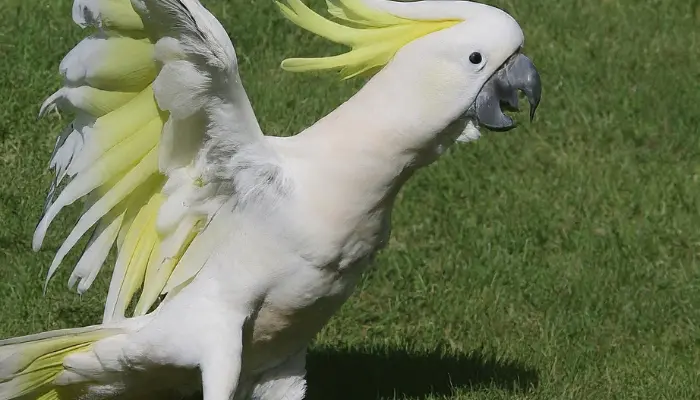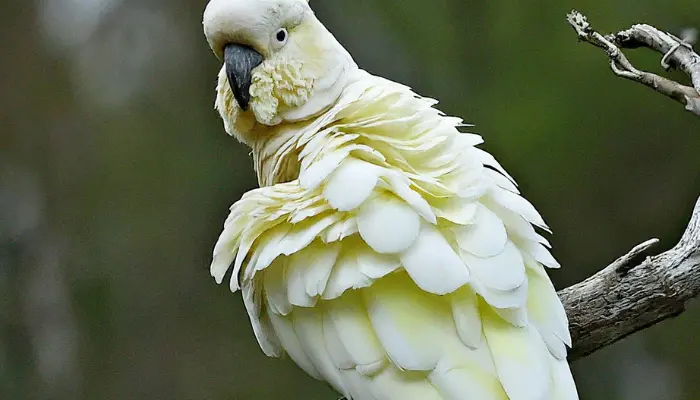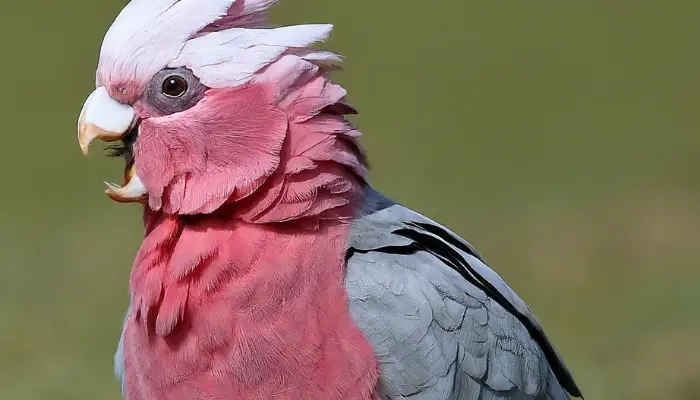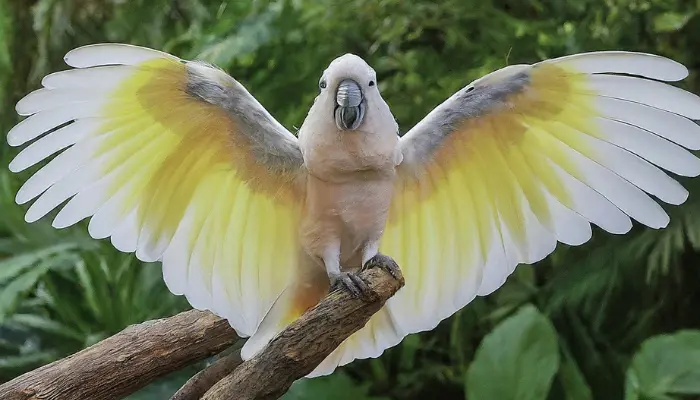Cockatoos are distinctive parrots from the family Cacatuidae and are known for their expressive crests and curved beaks. However, their high intelligence and social nature can sometimes lead to challenging behavior problems when their complex needs are not adequately met.
From incessant screaming and feather plucking to destructive chewing and aggressive tendencies, understanding and addressing these behaviors is crucial for maintaining a harmonious relationship with these vibrant parrots. This article explores the common behavioral issues in cockatoos, their underlying causes, and effective strategies for prevention and management.

Common Behavior Problems in Cockatoos
Cockatoos are intelligent and social birds, but they can develop behavior problems if their needs are not adequately met. Understanding these problems and their causes can help owners address and mitigate them effectively.
A. Feather Plucking
Feather plucking in cockatoos can arise from several underlying causes. Boredom is a common culprit, as a lack of mental stimulation and physical activity often leads these intelligent birds to pluck their feathers as a means to occupy themselves. Stress is another significant factor; changes in the environment, lack of social interaction, and inconsistent routines can cause considerable anxiety, prompting feather plucking. Additionally, medical issues such as skin infections, allergies, or hormonal imbalances can also lead to this behavior.
Signs and Symptoms
Owners may notice missing or damaged feathers particularly on the chest, wings, and back. The bird’s skin might show visible irritation or redness and scattered feathers can often be found in the cage or around the bird’s habitat.
B. Screaming
Screaming in cockatoos can vary between natural vocalization and excessive noise. Natural vocalization is a normal part of a cockatoo’s behavior serving as a form of communication, an expression of excitement, or a way to establish territory. However, when screaming becomes frequent and prolonged, it indicates a problem.
Signs and Symptoms
Cockatoos may scream for attention, especially if they feel neglected. This attention-seeking behavior is common in these social birds. Frustration from a lack of stimulation or unmet needs can also lead to excessive screaming.
C. Aggression
Aggression in cockatoos can manifest in various forms, including biting and lunging. Biting is often a defensive behavior or a way to express dominance, while lunging involves sudden aggressive movements towards people or other animals.
Signs and Symptoms
Territorial behavior can trigger aggression when cockatoos feel their space is being invaded. Fear is another significant trigger, new environments, unfamiliar people, or sudden changes can cause cockatoos to react aggressively out of fear.
D. Destructive Chewing
Chewing is a natural behavior for cockatoos helping them maintain their beak health and explore their environment. However, it becomes problematic when it turns destructive, resulting in damage to furniture, wires, or other household items.
Environmental Factors
Environmental factors play a crucial role in destructive chewing. Without suitable toys or materials to chew on, cockatoos will seek out other objects. Inadequate supervision also contributes to this behavior, as cockatoos left unsupervised in an unbird-proofed area are more likely to chew destructively.

Causes of Behavior Problems in Cockatoos
Understanding the causes of behavior problems in cockatoos is essential for providing appropriate care and ensuring the well-being of these intelligent and social birds. Here are the primary factors that can contribute to behavioral issues.
A. Lack of Mental Stimulation
Mental stimulation is crucial for cockatoos due to their high intelligence and natural curiosity. Without adequate enrichment and activities, cockatoos can become bored, leading to destructive behaviors such as feather plucking and excessive screaming. Enrichment can include toys, puzzles, foraging opportunities, and interactive play, all designed to engage their minds and keep them occupied.
B. Inadequate Social Interaction
Cockatoos are highly social birds that thrive on interaction with their owners and other birds. They form strong bonds and need regular social engagement to stay mentally healthy.
C. Improper Diet and Nutrition
A proper diet is vital for the overall health and behavior of cockatoos. Nutritional deficiencies or imbalances can lead to various behavioral problems. For instance, a diet lacking essential nutrients can cause lethargy, irritability, and even aggression.
D. Health Issues
Physical health has a significant impact on a cockatoo’s behavior. When a cockatoo is experiencing pain or discomfort from health issues, it can lead to increased aggression, feather plucking, and other undesirable behaviors.

Preventing Cockatoo Behavioral Problems
Taking preventive measures is crucial to ensure the well-being of cockatoos and to avoid the development of behavior problems. Here are key strategies for preventing these issues.
A. Proper Enclosure and Environment
A proper enclosure is fundamental for a cockatoo’s health and happiness. The cage should be spacious enough to allow for free movement and wing stretching. Ideally, the cage should be at least 24 inches wide, 24 inches deep, and 36 inches high for smaller cockatoos, with larger species requiring even more space. The setup should include multiple perches at varying heights, as well as climbing structures to encourage physical activity and mimic a natural environment.
Safe and Engaging Toys
Providing safe and engaging toys is essential to keep a cockatoo mentally stimulated and prevent boredom. Toys should be rotated regularly to maintain interest and should include a variety of types such as chewing toys, puzzle toys, and foraging toys. Ensure that all toys are made from non-toxic materials and are appropriate for the bird’s size and strength to avoid injury.
B. Balanced Diet
A balanced diet is critical for maintaining a cockatoo’s physical health and preventing behavior problems. Their diet should include a mix of high-quality pellets, fresh fruits, and vegetables. Seeds and nuts can be given, but in moderation, as too much fat can lead to health issues. Providing a variety of foods ensures that the bird receives all necessary nutrients.
C. Regular Veterinary Care
Regular veterinary check-ups are crucial for early detection and treatment of health issues that could lead to behavioral problems. Annual visits to an avian veterinarian can help monitor the bird’s overall health, dietary needs, and any potential issues that might be developing.
Identifying Early Signs of Problems
Owners should be vigilant in observing their cockatoos for early signs of health or behavioral problems. Indicators such as changes in eating or drinking habits, weight loss, changes in droppings, feather plucking, or changes in vocalization should prompt a visit to the vet. Early intervention can prevent minor issues from becoming serious problems.
